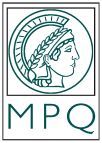
Max-Planck-Institut für Quantenoptik
About MPI für Quantenoptik
Research at the Max Planck Institute of Quantum Optics concentrates on the interaction of light and matter under extreme conditions. One focus is the high-precision spectroscopy of hydrogen. In the course of these measurements Prof. Theodor W. Hänsch developed the frequency comb technique for which he was awarded the Nobel Prize for Physics in 2005. Other experiments aim at capturing single atoms and photons and letting them interact in a controlled way, thus paving the way towards future quantum computers. Theorists on the other hand are working on strategies to communicate quantum information in a most efficient way. They develop algorithms that allow the safe encryption of secret information. MPQ scientists also investigate the bizarre properties quantum-mechanical many-body systems can take on at extremely low temperatures (about one millionth Kelvin above zero). Finally light flashes with the incredibly short duration of several attoseconds (1 as is a billionth of a billionth of a second) are generated which make it possible, for example, to observe quantum-mechanical processes in atoms such as the 'tunnelling' of electrons or atomic transitions in real time.
- Industry : Other
